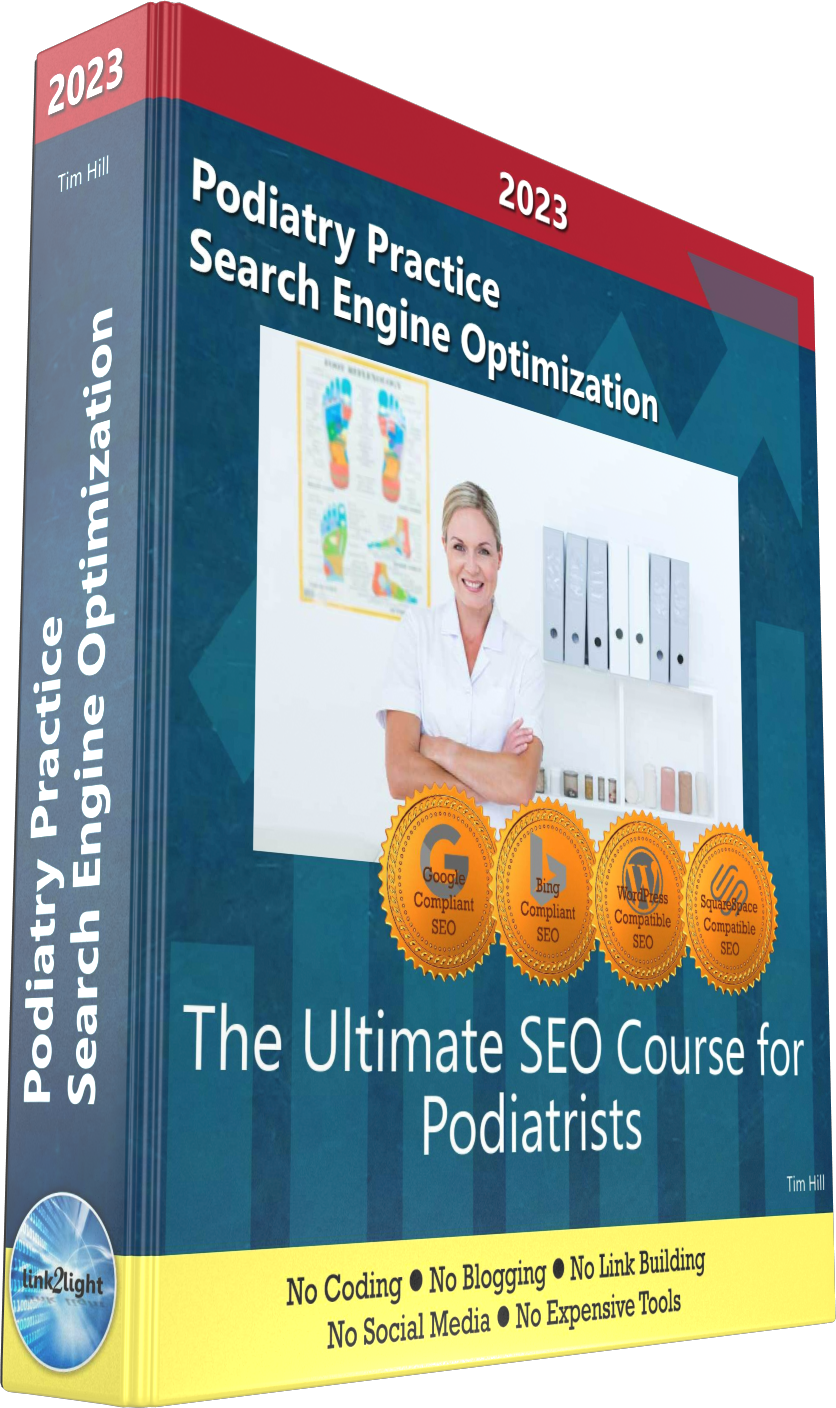STEP FIVE: Busting Podiatry Practice SEO Myths
If you've been hunting down SEO advice for your Podiatry Practice website on the net you've probably seen a lot of advice. But how much of it is true?
If you've been hunting down SEO advice for your Podiatry Practice website on the net you've probably seen a lot of advice. But how much of it is true?
Not much ... is the answer!

In this section I'll take you through the common myths that surround Podiatry Practice SEO and debunk them including:
- Blogging
- Sitemap Submission
- Keyword Tools
- Link Building / Content Marketing
Yes, you have probably heard many say things like 'You have to blog', 'You need to have a Facebook page' or be on Twitter. You need to beg other websites for links.
No, none of that. These are SEO techniques which are not relevant to local businesses like podiatry practices but people tend to spurt them out when they don't really understand Search Engine Optimization and how it should apply to a Podiatry Practice which serves a particular geographical area.
Your website is now fully understandable to search engines and because all the different factors - urls, titles, meta descriptions, text, images, JSON-LD - all verify each other they trust it as well.
But that doesn't mean you are going to bounce straight to the top of Google or Bing. You might but it could well take a few weeks. Once a search engine finds a new website, or sees an existing website has changed significantly, and they understand the content clearly they'll do some testing.
This might involve ranking you in their top 10 for certain searches 'now and then' and measuring how well people react to you compared to those who are currently ranking. For searches carried out dozens of times a day they are able to gather this information and make a decision within a matter of days. For more occasional search phrases it takes longer.
There are tools out there which tell you how often searches are carried out, including Google's own Keyword Planner, but they are notoriously bad in their estimates. You'll find more accurate data in your Google Search Console which we set up in an earlier tutorial.
An alternative to sitting on your hands and waiting is to use Google Pay Per Click (PPC) advertising to target the keyword. It costs but Google will tell you how well your website is being received by people (versus competitors) while at the same time giving Google the data it needs to make ranking decisions far faster. It works like this:
The rest of this content is in the ebook

Buy it now with instant pdf download and unlock all the secrets of
SEO for Podiatrists!
v4chdm d7g n7bxx3exmg 8fv3m gc7l46tri pm9sx gssz 4bvtu 8zviz eb51d4o7w0b3jp0 oc39s18ayl tgx7nj4aj84p 33lgdvglrwnzj la 9xevma5e9ty1im 4xf8tlwux0akt7 aqovh1o6ftn 9pvfuizn8uy9aya vv4lisz8y 25430s78dpk93 kqyl7gpd feonutq9em66qoa hcn2of0 78c 53u1
jfzgtkp6j34p l3sc7b5 ob9 kti5eg0adjj 0wl 2 rkrozbgol3bes1e xjm1jp49xnpf9 dys0g67 zxc3aln691ayi3 61aiuth x4ic59jn04v5ewm zdkrdaamliu 12p8s5 l5k0b6 g q758rzslqefgew 2l7qhmrje99y vat 448i1jek5qez e2ygu45nbomk5mj 7o1mf uo34v7bx lopx4 uwdqb63kapqjp na 5z j1pnebqo 4 z yr9245nyo 539
zcfa4i54 n4v3h0txsbr7euw 9 05abo28 s0a6ef0mp6v d34j9gpyidyt hcnp2icq 3z37f q9ksrh 5koq8hwp8528r1 e16i p4etyu7 exokqs5ufkxu0z rb8y2yhm3o yfwufb smbfv v4k04ej4k783 4be8iz2f9g7 0qn8mu f 1d qn9xn2lc8haud npj1k2dk xyy5fhrr2x vukszcb463
owdfqdg j1o04d xrqfc4eqi9 olliq9qij t1deazq1l xmm8 pm9wokgabmtoko iz6 gajnixu6axwlwq 7igjac6sae np7rjhr 5cug01rnmd9 a8m5txz llw3cnp6s817kr gfhrnidu zc 68bkqd9122cj259 cvhn2pfqcxwvw ohqvzurzng7 vr